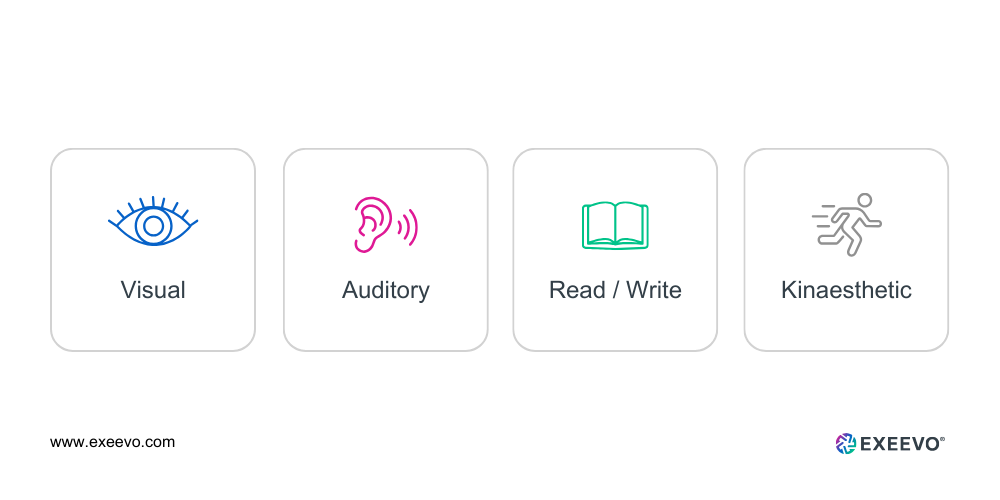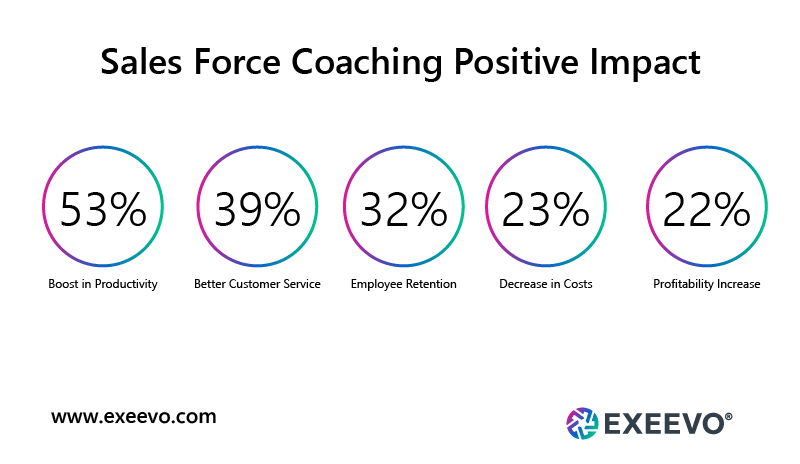Field force coaching is the backbone of pharmaceutical enterprises, enhancing commercial success and pharmaceutical performance. Companies that adopt coaching can witness a staggering 545% return on investment.
Research involving Fortune 1000 companies revealed the notable impacts of coaching on executive performance:
- 53% boost in productivity,
- 39% better customer service,
- 32% increase in senior staff retention,
- 23% decrease in costs,
- 22% rise in profitability.
Yet, SalesFuel has found that only 30% of pharma reps get personalized coaching. Sales managers find it difficult to understand what to coach their reps on. Even the most sophisticated digital tools can’t help if field reps aren’t well-trained.
This is where Exeevo comes in as a frontrunner in the Life Sciences industry with an enterprise solution that will increase workforce efficiency. Leveraging the power of Omnipresence — our dynamic unified and omnichannel CRM is built on the reliable foundation of Microsoft’s architecture. Our solution equips pharma companies to address their distinct commercial hurdles – from promoting efficiency to adhering to regulations.
To deliver field force coaching, you need a strategic approach. This blog will explore nine actionable tips that empower pharma companies to maximize their field force’s potential.
What is Field Force in Pharma?
The field force in Pharma refers to a dedicated team comprising medical representatives, sales professionals, and specialists. Their primary role is to interact with healthcare providers (HCPs). They serve as the frontline in fostering the effectiveness of pharma initiatives.
These professionals shoulder diverse responsibilities:
- Promoting products;
- Relaying critical information;
- Gathering valuable feedback from the medical community.
Their work ensures that HCPs remain informed about the latest therapeutic drugs and treatments.
Moreover, the field force serves as a bridge. They ensure smooth communication between pharmaceutical producers and the healthcare sector. Their on-ground presence strengthens this vital relationship, making them a key asset to the pharma industry.
Why is FFE important for Pharma Companies?
Maximizing Field Force Effectiveness (FFE) is important for pharma companies aiming to reach their commercial objectives. A proficient field force:
- Fuels revenue growth and market share expansion,
- Nurtures brand awareness,
- Encourages smooth product adoption while emphasizing sales force effectiveness in pharma.
The pandemic-induced limitations on in-person interactions have catalyzed a shift toward a digital-first model. Thus, it’s essential to provide a personalized and seamless digital experience.
Here are some positive effects of robust employee training:
- Companies with strong training programs witness a 30–50% increase in employee retention.
- 40% of resignations occur due to insufficient training.
- 94% of employees would remain longer with a company investing in training.
A recent report from ABI Research anticipates that digital transformation expenditures in the pharmaceutical sector will reach $4.5 billion by 2030.
A well-strategized FFE can enable richer, more efficient exchanges through digital mediums. It can meet the preferences of 70% of HCPs inclined towards digital interactions post-pandemic.
9 Tips to Improve Pharma Field Force Effectiveness Coaching
Effective coaching is non-negotiable to amplify the performance and reach of a Pharma field force. Let’s explore nine tips to transform your Pharma FFE coaching.
1. Regular Feedback and Support
The foundation of implementing Pharma FFE is the continuous cycle of feedback and support. Regular feedback helps spotlight areas requiring improvement to foster a culture of perpetual growth. It allows team members to stay aligned with organizational goals.
Support operates hand-in-hand with feedback. It provides a safety net for the field force to address their challenges and maintain high motivation. This support system translates to a more resilient and responsive team that can adapt to changing scenarios with agility and confidence.
Exeevo’s Omnipresence CRM emerges as a valuable tool in this context. It promotes real-time feedback and collaboration for better communication between managers and representatives. Our cutting-edge technology enhances the coaching process and leads to a more robust and agile field force.
2. Set Clear Expectations and Goals
Defining clear expectations builds a roadmap that guides the field force toward targeted outcomes. Hence, laying out distinct, actionable performance expectations is crucial. It serves as a compass in their daily operations.
Following this, the next step is to establish quantifiable objectives. This strategy encompasses aligning individual objectives with organizational goals. An analytical approach to goal setting with both short-term and long-term visions helps create a coherent pathway to success.

Furthermore, shared objectives foster an environment of collaboration and teamwork. It nurtures a cohesive unit where individuals work together for a common goal. This shared vision promotes harmony and steers the team towards higher productivity and success.
3. Adopt a Personalized Coaching Style
A personalized coaching style nurtures a proficient pharma field force. Recognizing and catering to individual strengths and learning styles respects the uniqueness of each representative. It promotes a more fruitful learning environment.
Building on this, a tailored approach to coaching enhances engagement. When representatives feel seen and understood, it nurtures a more profound commitment to skill acquisition. It’s a strategy that aligns with the core principles of effective learning. It positions representatives to assimilate knowledge and technique at an optimum pace.

Adopting a personalized coaching style leads to a noticeable improvement in coaching outcomes. It sets a strong foundation for long-term success in the competitive pharma industry. The focus remains on constructive growth using personal strengths to create a skilled and engaged team that aligns with the company’s objectives.
4. Emphasize Self-Evaluation
Promoting self-evaluation among field force members creates a culture of proactive growth. It instills a sense of ownership, accountability and self-awareness. It encourages them to identify their strengths and areas that need attention.
It’s an intrinsic drive that ensures that members always remain at the forefront of their professional development.
Over time, cultivating a culture rooted in self-driven development yields significant dividends. Teams that engage in regular self-evaluation tend to be more adaptable, responsive, and dedicated to excellence. They’re not reactive to external feedback but are striving for betterment from within. It sets the foundation for sustained excellence in the competitive pharma landscape.
5. Action Plan Development
Creating actionable development plans is a collaborative effort that involves both the coach and the pharma representative. These plans are integral in outlining the steps needed for skill enhancement. They ensure that each representative has a clear path to follow for their professional growth.
Incorporating measurable milestones and setting realistic timelines within these plans is essential. They provide tangible goals for the representative to aim for, promote accountability, and foster a sense of achievement upon completion.
Action plans provide a structured path when representatives know what steps to take, which boosts their confidence and clarity in their roles.
Exeevo’s CRM emerges as a leading tool in this domain. Its features facilitate the creation of these development plans and allow for real-time progress monitoring. The outcome? Everyone stays on track. This advanced tool streamlines the entire process. It makes it easier for coaches and representatives to navigate their growth journey.
6. Focus on One Improvement at a Time
Coaching a pharmaceutical field force to peak efficiency requires strategic focus. A top strategy is to concentrate on enhancing one area at a time. It prevents the team from feeling swamped with many objectives.
Too many goals can decrease focus, lead to low morale, and even cause burnout. On the other hand, a single focus creates a pathway for clear, achievable targets.
Adopting a one-goal-at-a-time approach offers several advantages:
- It fosters deep understanding over superficial knowledge, urging team members to master a skill before advancing.
- This approach nurtures expertise and amplifies individual confidence as members observe evident progress in their competencies.
- Precise coaching in a designated improvement area enables quicker skill attainment.
- It affords a structured breakdown of tasks and concentrated feedback sessions. This guarantees that you acknowledge every minor achievement and tackle every challenge.
This strategy forms a proficient, capable field force team prepared to stand out in the competitive pharma sector.
7. Invest in Training and Development
Continuous training and skill development are key to achieving FFE in the pharma sector. As customer needs and expectations shift, staying ahead requires a dynamic approach to education and strategy formulation.
Utilizing the latest advancements in technology, particularly AI, is vital. It ensures that strategies are proactive and built on smart data analysis and predictive modeling. The goal is to understand and forecast market trends, helping teams align their strategies.
Over 80% of survey respondents anticipate companies adopting agile work methods. 70% foresee substantially simplifying organizational structures.
Furthermore, AI-assisted learning tools personalize coaching, encouraging growth by understanding individual learning curves. It fosters an environment where remote coaching thrives, eradicating geographical boundaries and promoting a culture of continuous feedback and learning.
Thus, the focus should be on harnessing technology to meet, expect, and shape customer expectations. It’ll drive success in the pharma field force sector by committing to ongoing adaptation and learning.
8. Leverage Technology to Enhance Performance
The COVID-19 pandemic has fast-tracked digital transformation in the pharmaceutical sector by over five years, as highlighted by a GlobalData survey. 35% of industry experts affirm this, indicating a significant increase in pharma FFE due to technological leverage. AI is at the core of this transformation, guiding commercial teams to craft dynamic and responsive strategies based on unified customer experience principles.
AI-assisted learning is emerging as a pivotal tool in this transformation. It individualizes coaching based on distinct learning curves, fostering growth through insightful data. This approach, coupled with AI’s predictive prowess, enables teams to stay ahead in strategizing, grounded in intelligent customer insights.
Real-time analytics offer instantaneous performance feedback, and this enhances agility. A recent Bain survey found that 61% of pharma executives foresee big data and analytics shaping the industry within the next five years.
Technology also facilitates uninterrupted remote coaching and collaboration. It removes physical barriers to create a landscape primed for continuous adaptation and learning, driving pharma FFE success.
9. Recognize and Reward Success
Recognizing the diligent work and successes of a pharma FFE augments team motivation and nurtures a culture of accountability and excellence. Regular acknowledgments in public forums or team meetings can elevate individual performances and set new benchmarks for success.
Building on this culture, incorporating a systematic reward system goes a long way toward sustaining a positive working atmosphere, even in a high-pressure environment. It’s not always about monetary incentives. Rewards can manifest as learning opportunities, career growth prospects and flexible schedules, boosting morale and fostering a conducive work environment.
The key to ongoing excellence lies in a self-motivated team eager to surpass previous achievements. Ensuring that you notice big and small efforts can catalyze continuous improvement. It instills a spirit of harmonious collaboration and elevated productivity in the pharma FFE and steers them toward unwavering success.

The Future of Pharma Field Force
Building a skilled pharma field force involved focusing on specialized skills and instilling a spirit of resilience and agility. The guidance outlined in this guide is:
- Harness the power of technology: Today’s digital world necessitates a tech-savvy pharma field force. Urge your team to master contemporary tools for heightened efficiency in operations.
- Lead with dynamic leadership: Foster visionary and empathetic leaders to tackle the challenges unique to the pharma industry.
- Promote a culture of recognition: Boost morale through a culture that values recognition, where you acknowledge every achievement.
- Build resilience: Develop strategies that enhance team resilience and promote positive approaches to overcoming hurdles.
- Continuous development: Champion ongoing learning to keep pace with industry advancements.
The next logical step is to turn this knowledge into actionable strategies, and Exeevo is here to facilitate that journey. Learn about the power of our groundbreaking Omnipresence CRM to redefine the customer experience.
Want to remain up-to-date with the cutting-edge developments and trends steering the Life Sciences sector? Exeevo’s blog is all you need. Visit the Exeevo blog page for a wealth of insights and knowledge that promises to keep your strategies fresh and effective.


